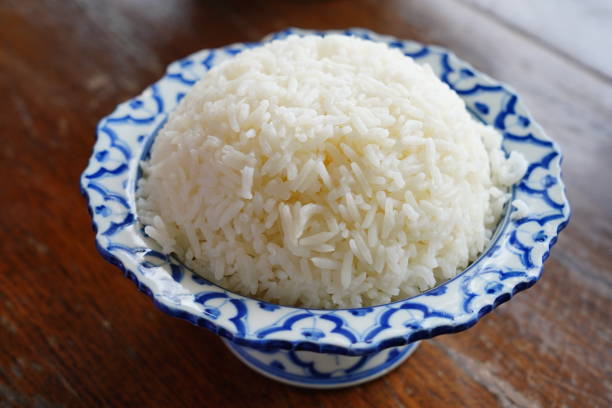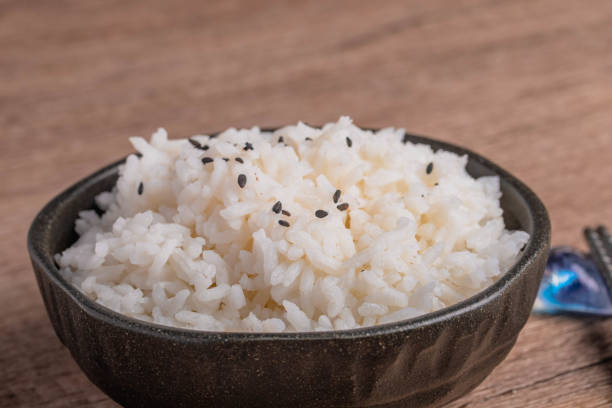Jasmine rice is a staple in many households across the world. It’s a long grain rice that’s known for its sweet and fragrant aroma, making it a popular choice for dishes like stir-fries, curries, and salads. It’s also an excellent source of carbohydrates, which is a vital source of energy for our bodies. But what many people don’t know is how many calories are in a cup of jasmine rice.
A cup of cooked jasmine rice contains approximately 205 calories. This serving size is considered to be a standard portion and is approximately equal to a medium-sized fist. The calorie count for jasmine rice may vary slightly depending on the method of preparation and the brand of rice being used.
Calories in jasmine rice come from three primary macronutrients – carbohydrates, protein, and fat. A cup of cooked jasmine rice contains 45 grams of carbohydrates, 4 grams of protein, and less than 1 gram of fat. This means that carbohydrates contribute the most to the calorie count of jasmine rice, followed by protein and then fat.
When it comes to carbohydrates, jasmine rice is an excellent source. Carbohydrates are an essential macronutrient that provides energy to our bodies. In addition to energy, carbohydrates also play a crucial role in maintaining the health of our brain, nervous system, and muscles. However, it’s important to note that not all carbohydrates are created equal.
Calories in Jasmine Rice
A cup of cooked jasmine rice contains around 205 calories. This serving size contains approximately 45 grams of carbohydrates, 4 grams of protein, and almost no fat. The calorie content of jasmine rice is relatively low, making it a good option for those watching their calorie intake.
Carbohydrates: Jasmine rice is primarily composed of carbohydrates, with around 45 grams per cup. These carbohydrates are in the form of starch and provide energy to the body. When consumed in moderation, jasmine rice can be a healthy addition to a balanced diet, but it should be consumed in conjunction with other nutrient-rich foods.
Protein: Jasmine rice contains a moderate amount of protein, with 4 grams per cup. Protein is essential for building and repairing the body’s tissues, and is also important for maintaining a healthy immune system.
Fat: Jasmine rice is a low-fat food, with almost no fat per cup. This is great news for those looking to control their fat intake. Fat should be consumed in moderation, as too much can lead to weight gain and other health problems.
Fiber: Jasmine rice contains a minimal amount of fiber, with less than 1 gram per cup. Fiber is important for maintaining digestive health and preventing constipation. It is recommended that people aim to consume at least 25-30 grams of fiber per day.
Vitamins and Minerals: Jasmine rice is a good source of some vitamins and minerals, including thiamin, niacin, and iron. Thiamin is important for converting food into energy, while niacin helps maintain healthy skin, nerves, and digestive system. Iron is essential for carrying oxygen to the body’s cells, and for maintaining a healthy immune system.
Jasmine rice is considered a high-glycemic index (GI) food, meaning it has a significant impact on our blood sugar levels. When we consume high-GI foods, our blood sugar levels rise rapidly, which can cause a spike in insulin levels. This can lead to feelings of fatigue and hunger soon after eating.
On the other hand, jasmine rice is a relatively low-fiber food. Fiber is an important part of a healthy diet as it helps regulate our digestion and keeps us feeling full for longer. A lack of fiber in our diets can lead to digestive problems, including constipation and diverticulitis.
In terms of protein, jasmine rice is a good source of this macronutrient, but it’s not considered a complete protein source. This means that it doesn’t contain all of the essential amino acids that our bodies need. To ensure that we get all the essential amino acids, it’s recommended to combine jasmine rice with other protein sources, such as beans, lentils, or meats.
When it comes to fat, jasmine rice is an extremely low-fat food, with less than 1 gram of fat per cup of cooked rice. This makes it an ideal food for those looking to reduce their fat intake. However, it’s important to remember that not all fats are created equal, and it’s still essential to include healthy fats, such as omega-3 fatty acids, in our diets.
In conclusion, jasmine rice is a versatile food that can be enjoyed as a side dish or as a main dish. With 205 calories per cup of cooked rice, it’s an excellent source of carbohydrates and a good source of protein. However, due to its high-GI nature, it’s important to balance it with other low-GI foods and fiber-rich foods to help regulate our blood sugar levels and ensure that we get all the essential nutrients our bodies need.

 Home
Home Health
Health Diet & Nutrition
Diet & Nutrition Living Well
Living Well More
More












